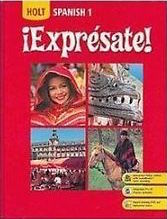
All Solutions
Page 87: 9
“_________?”
“I like to read magazines.”
“What do you like to do?”
The first answer is, “I am from Chile”.
“_________?”
“I like to read magazines.”
“What do you like to do?”
The second answer is, “I am sixteen years old”.
This activity is related to elaborating questions according to the answer given.
Let’s read / write. Read the answers that Andrés gave during his interview. Then write the missing questions.
| Spanish| English|
|–|–|
| 3.- Soy extrovertido y gracioso.|I am outgoing and funny. |
In the answer, the subject is the first person of the singular **Yo**, so the question must be with the second person of the singular **Tú**.
Andrés is giving a description of his way of being, so the question could be:
| Spanish| English|
|–|–|
| 3.- ¿Cómo es tu forma de ser?|How is your way of being?|
This activity is related to elaborating questions according to the answer given.
Let’s read / write. Read the answers that Andrés gave during his interview. Then write the missing questions.
| Spanish| English|
|–|–|
| 4.- Me gusta ir al cine y hacer deporte.|I like to go to the movies and do sports.
In the answer, the subject is the first person singular **Yo**, so the question must be with the second person singular **Tú**.
Andrés is saying what he likes, so the question could be:
| Spanish| English|
|–|–|
| 4.- ¿Qué te gusta hacer?|What do you like to do?
This activity is related to elaborating questions according to the answer given.
Let’s read / write. Read the answers that Andrés gave during his interview. Then write the missing questions.
Spanish| English|
|–|–|
| 5.- Me gusta ir al cine con mis amigos..|I like to go to the movies with my friends.
In the answer, the subject is the first person singular **Yo**, so the question must be with the second person singular **Tú**.
Andrés is saying who he liked to go to movies with, so the question could be:
| Spanish| English|
|–|–|
| 5.- ¿Con quién te gusta ir al cine?|Who do you like to go to the movies with?

